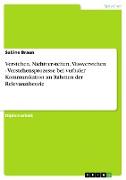Verstehen, Nichtverstehen, Missverstehen - Verstehensprozesse bei verbaler Kommunikation im Rahmen der Relevanztheorie
BücherAngebote / Angebote:
Diplomarbeit aus dem Jahr 2004 im Fachbereich Sprachwissenschaft / Sprachforschung (fachübergreifend), Note: 1, 5, Europa-Universität Viadrina Frankfurt (Oder), 102 Quellen im Literaturverzeichnis, Sprache: Deutsch, Abstract: In the present paper the following questions will be raised and discussed: What do we understand if we understand? How do we understand what we understand? And how do we manage to understand at all? Why do we sometimes fail to understand each other? Should misunderstandings be seen as avoidable exceptions in the process of understanding or are they a common place phenomenon? And who or what is to blame for their occurrence?
That is to say this paper is supposed to deal with the question whether understanding of verbal utterances can be considered as usual case or whether it is more likely for communication to fail. Accordingly it will be tried to answer how successful communication might come into being as well as how the occurrence of non-understanding and misunderstanding(s) could be explained.
This paper is divided into three parts. The first one captures the definitions of understanding, non-understanding and misunderstanding(s) as they are essential notions to the overall paper.
The second part is aimed to giving a focused overview over existing studies in the wide sphere of misunderstanding research.
The third part treats the relation between Grice's ideas and the Relevance-Theoretic-approach to communication. In 1967 Herbert Paul Grice made an important contribution to modern pragmatics: Based on the observation that an utterance communicates much more information than just its semantic content, he established the fact that human communication is governed by general principles on the assumption of which the hearer is able to recover the implicated content of an utterance. But although Grice's basic ideas are very convincing, he has left many problems open for further elaboration. The Relevance Theory (RT) of Dan Sperber and Deirdre Wilson can be seen as having achieved this task by further developing Grice's basic ideas into a powerful explanatory model of communication and cognition.
After pointing out the impact of Grice's approach on RT, it will be shown how RT emerged out of a critical reassessment of Grice's ideas. As a result it should become clear how it exceeds Grice's rather sketchy model of communication and what benefits the RT-approach is able to provide for linguistic analysis concerning successful understanding of verbal utterances as well as the occurrence of communication failures such as non- and
misunderstanding(s).
Folgt in ca. 2-3 Arbeitstagen
